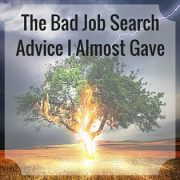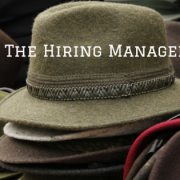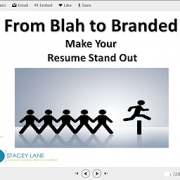Formula for a Great Resume
Resumes - etc.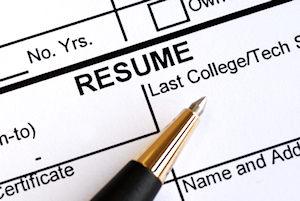 If you’re struggling to write a great resume, you’ve got a problem. That problem is you. You know what I mean – your insider perspective is making it difficult for you to pick out the parts of your experience that are most relevant to a potential employer. You’re focused way too much on the detail, and you forget that the big picture/forest is important too.
If you’re struggling to write a great resume, you’ve got a problem. That problem is you. You know what I mean – your insider perspective is making it difficult for you to pick out the parts of your experience that are most relevant to a potential employer. You’re focused way too much on the detail, and you forget that the big picture/forest is important too.
Remember, a great resume makes it easier for the reader to see how you fit what they’re looking for, so you get an interview. It communicates why they should consider meeting you.
Much like why it’s impossible to discern your personal brand without outside input, it’s hard to write your resume when you’re “caught in the weeds” or details of your experience. You’ve lived your experience, day in and day out, for years. It’s hard to describe familiar things.
For example, try describing a saltine cracker (cracker #1). Now describe that cracker you had at that holiday party that is equal parts crunchy, savory and salty (cracker #2). I’m betting that the words you used to describe cracker #2 were more colorful, descriptive and unique, right?
Let me break it down and actually show you how I connect dots when I’m writing a client’s resume. Content is king, which is why I focus on two essential items to transform your resume from good to great. They are: focus on the specific, relevant experience in the job description and what makes you unique.
Regarding the job description, you’ll want to dissect it based on the application of specific/relevant experience NOT on generic skills.
Below is an actual job description for a Talent Planning Coordinator. I have highlighted 5 parts that I would use to connect the dots between your experience and what they’re looking for. This isn’t a perfect science, but this is where I would start.
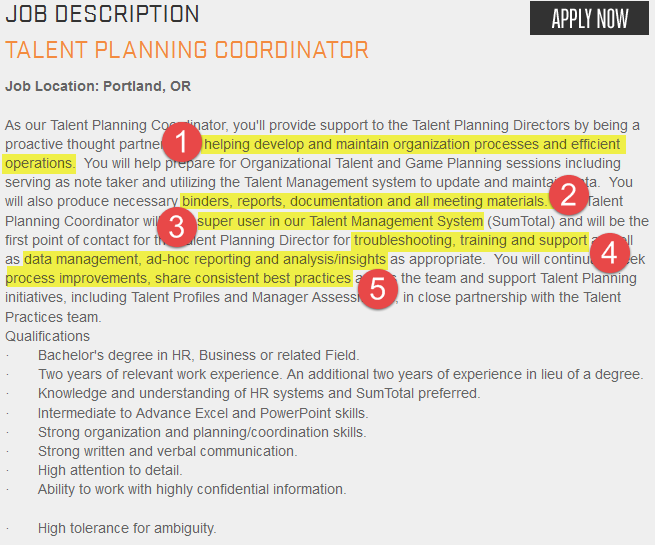
Looking at the job description graphic items #1 and #2: What processes have you helped to streamline? Organize? Make more efficient? Any that relate to hiring or recruiting? If not processes, have you been involved with projects that have to do with people? What’s your relatable experience with documentation and reports? Be specific about the impact of the report or the importance of the documentation. It might be obvious to you, but make it obvious to the reader.
#3: You might not be a super-user on job description software, but are you familiar with other similar management software? Provide the name of the software (or, it’s an in-house proprietary system, tell them that too).
Points #4 and #5: Talk about troubleshooting, reporting and in general, and being a resource to the Directors. Give a tangible example in your work experience. Have you supported other directors in another industry in this same type of role? Is it clear what the problem was and how your efforts solved the problem? They want to know that you’ve got experience in this type of role. Prove it.
Want to know the quickest way into the weeds or getting bogged down with the details? Focus on the Qualifications section. Seriously. Many job seekers pay so much attention to the qualifications section that they miss how they can connect the dots to their experience.
Notice how generic the qualifications are? If you spend too much time talking about PowerPoint, Excel and how you’re a great communicator, you’re going to waste precious real estate (that’s your resume) on the wrong features. Focusing on the wrong features is all too common. For example, if someone is looking to buy a house, they’re not going to be interested in “a tent that has a cool and unusual front door flap.” A tent is not a house, even with the cool door flap feature. Know what your audience wants.
Now to the second essential item that you want to focus on with your resume. You want to be crystal clear about what makes you most unique. This is a huge opportunity to stand out by not worrying about blending in. Frankly, most of my clients don’t fit the “typical job candidate” mold. But what works for them is that they’ve gotten clear about what’s unique and they’re not afraid to highlight it (within reason – see comment about “house versus tent”) because they know how to make it relevant to the job at hand.
Don’t tell me that you’re a great people person. Or that you always get the job done. Those are great attributes, but they’re generic.
Breathe some life into them and get some outside input on what makes you most unique. Get to the core of what your brand of “people person” is. For example, does it mean that you relate to all different types of people? Or that you easily engage others? Or maybe that you’re easy to get to know and make people feel comfortable?
How can your resume support your personal brand with relevant examples? Sometimes it’s your career path that makes you unique (for example, you worked your way up) or maybe it’s that you have some outside knowledge that would be incredibly useful to an employer.
Get clear because if you’re not clear, the person reading your resume isn’t going to be either. For your resume, you want the thread or theme of your experience to be crystal clear.
Want another trick? Take out a fresh sheet of paper and write down your ten most important career accomplishments. See if a few career threads emerge that not only reflect your personal brand but help you create a cohesive career story with your resume.
 I’m Stacey Lane: Confidence Builder. Networking Smarts. Resume Wordsmith. Personal Branding Strategist. Career Coach. I help individuals with unique backgrounds find their perfect fit and effectively market themselves so they find work that is as interesting as they are.
I’m Stacey Lane: Confidence Builder. Networking Smarts. Resume Wordsmith. Personal Branding Strategist. Career Coach. I help individuals with unique backgrounds find their perfect fit and effectively market themselves so they find work that is as interesting as they are.

